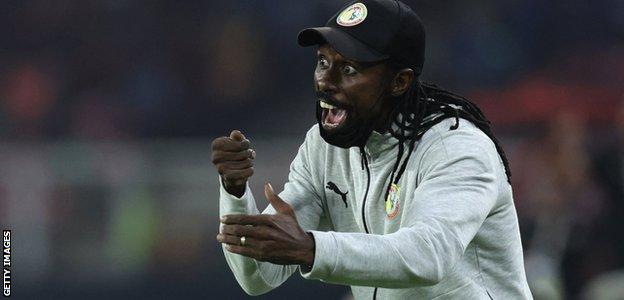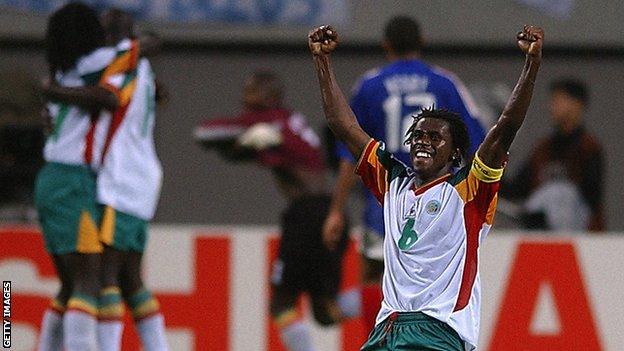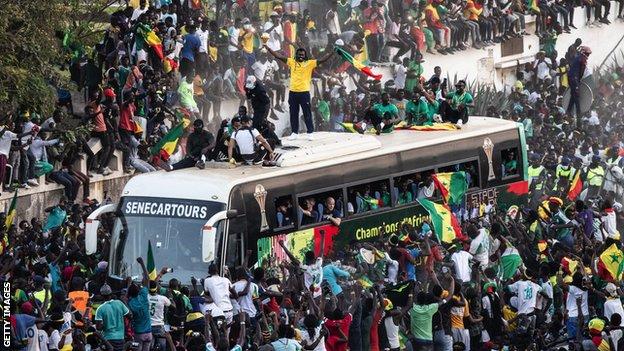Aliou Cissé pointedly looked around Bamako's Stade du 26 Mars, then began a long run-up and blasted his penalty kick on to the shins of Boukar Alioum to hand Cameroon the 2002 Africa Cup of Nations.
The final of the tournament in Mali was the first opportunity for Senegal to lift the continent's most treasured sporting prize, but their captain botched the script with the final attempt of the shootout following a 0-0 draw after extra time.
It has taken 20 years - almost to the day - for Cissé to expunge those demons and finally get his, and Senegal's, hands on the trophy.
At 45 - he will be 46 next month - Cissé is the second-youngest coach to win the title, after Herve Renard with Zambia in 2012. He is also now a poster boy for a growing stable of African coaches at the top of the continent's game after years of jobs being dominated by European and Latin American imports.
Cissé was in tears, and did jigs of joy, after Sunday's final victory over Egypt, but not before having to go through the gut-churning agony of another penalty shootout before finally being crowned African champions.
It was a first glimpse at the emotions swirling inside a usually stoic-looking coach, whose discourses with the media are clear and precise but rarely give away any hint of what lies behind the man.
That is reserved for the inner sanctum of the team and now, too, the post-match celebrations.
A no-nonsense coach who faced criticism
This was a fifth Nations Cup for Cissé; two as a player in 2000 and 2002 and now three in a row as coach.
It was also a vindication of the Senegalese Football Federation sticking with a man who has had to run a gauntlet of criticism, often from his own former team-mates too, yet has delivered the goods.
Both Khalilou Fadiga, who was in Cameroon on the Confederation of African Football's technical study group, and El Hadji Diouf - who Cisse allowed to be part of the squad as a mentor for the group - were seen celebrating with him on Sunday, having previously been among his most damning critics.
"This team has the ability to win an Africa Cup of Nations, but that cannot be achieved if Aliou Cissé remains at the helm of the national team," Diouf said three years ago.
That Cissé was able to see beyond this is testimony to his character.

The criticism not only motivated Cissé but also the players. "I think this man deserves all the success he gets because he is the most criticised coach I have ever seen in my life, but he never gives up," said forward Sadio Mane after Senegal beat Burkina Faso 3-1 in last Wednesday's semi-final.
"We would like to win for our country and for him because he deserves it after everything he has been through as a player and now as a coach."
Not that Cissé is beloved of his players all the time. They jokingly nicknamed him 'Jammeh" after Yahya Jammeh, the long-serving former president of Senegal's neighbour The Gambia, because of his strict approach.
Cissé is a no-nonsense disciplinarian, insistent on hard work, good time keeping and a focused approach. Frivolity is not one of his strong points.
A 'workmanlike' player forged in the Parisian outskirts
Cissé was born in Ziguinchor but moved to France aged nine, growing up ironically a stone's throw from the home of Djamel Belmadi, the previous Nations Cup-winning coach with Algeria, in Champigny-sur-Marne, in the southern suburbs of Paris.
He said: "As a child, I used to go to the Parc des Princes to see Safet Susic, Valdo... all these great players. My dream was to play for Paris St-Germain. A lot of young people from the suburbs dream of joining the youth academy, but I didn't have the opportunity."
Instead Cissé got his break in Lille in their academy and went onto make his professional debut at Sedan. He finally got to join PSG in 1998. "I've played alongside great players like Jay-Jay Okocha and Ronaldinho. I learnt a lot because I was a young player and I had the chance to play a few games at a big club," he said.
Former Senegal coach Bruno Metsu brought Cissé into the national team and he skippered the side that shocked World Cup holders France in the opening game of the 2002 tournament.

That squad went all the way to the quarter-finals in Japan and South Korea, becoming only the second African country to progress that far.
Stints at Birmingham City and Portsmouth followed, and soon after his arrival in England he had to deal with the tragic loss of 12 members of his family in a ferry disaster off the West African coast.
Cissé returned to Sedan in 2006 and finished his career in Ligue 2 at Nimes. He was never a star performer, rather described as "workmanlike".
Taking the reins of the Teranga Lions
Cissé took his coaching badges and joined the Senegal federation as an assistant to Olympic coach Karim Sega Diouf for the London 2012 Olympics.
He then worked under Alain Giresse with the national team, and took over in March 2015 after a horrid Nations Cup in Equatorial Guinea, where Senegal were one of the pre-tournament favourites but did not get past the first round.
Cissé has quietly forged his path ever since, winning his first match in charge over Ghana in a friendly in Le Havre and now the veteran of 71 matches.
Senegal have qualified for three successive Nations Cups plus the last World Cup in Russia. His record in charge of the Teranga Lions is 46 wins, 16 draws and only nine defeats.
Having lost to Algeria in the 2019 final and returned to lift the trophy in Cameroon, Cissé praised his squad's mentality after ending the country's wait for silverware.
"We dedicate this victory to the Senegalese people, because since independence, until now, we are running after this first star," he said. "Today, we will also have a star on our shirt."
But, as the well-worn cliché goes, 'you are only as good as your next match'. This week's celebrations, which saw tens of thousands line the streets of Dakar to welcome the victorious side home, will quickly turn now to preparations for the World Cup play-off against Egypt late next month.



Comments